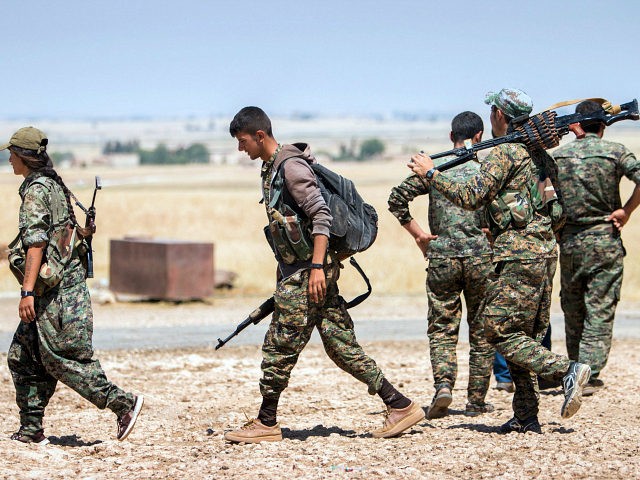Syrian Kurdish fighters belonging to a ground coalition known as the Kurdish-Arab Syrian Democratic Forces (SDF) say the U.S.-led coalition against the Islamic State has provided them with unprecedented weapons support, expressing optimism that President Donald Trump will help their struggle more than the Obama administration did.
“Previously we didn’t get support in this form, we would get light weapons and ammunition,” Talal Silo, a spokesman for the SDF, told Reuters. “There are signs of full support from the new American leadership – more than before – for our forces.” Silo specifically attributed the change to a change in leadership at the White House, Reuters added.
Silo also spoke to the Agence-France Presse, telling them that the SDF “have had meetings with representatives of the new administration, and they promised us extra support.” This appears to be in addition to the recent shipment, however, which had been scheduled during the twilight of the Obama administration.
The U.S. coalition confirmed that they had sent a shipment of armored tanks to anti-Islamic State Syrian forces but denied that the forces in question were Kurdish. “The decision was made by military commanders, and has been in the works for some time,” U.S. military spokesman Colonel John Dorrian confirmed, clarifying that the delivery of armored vehicles was meant for the Syrian Arab Coalition specifically. “The Reuters report inaccurately implied that U.S. weapons were transferred to Kurdish elements of the Syrian Democratic Forces,” he said.
The Syrian Arab Coalition is a member of the SDF, however. The AFP reports that two-thirds of the members of the SDF are fighters from the Kurdish People’s Protection Units (YPG), an official militia of the People’s Democratic Union (PYD) of Syria. The PYD seeks to establish a Kurdish state within Syria.
A spokesman for the YPG told the Russian propaganda outlet Sputnik that they had not received the weapons in question. “We in the Kurdish Popular Defense Units emphasize that these reports are incorrect as we have not received any weapons from the Alliance,” spokesman Redur Khalil said.
A move to arm the YPG would cause significant tension in the bilateral relationship between the United States and Turkey. While the United States often coordinates airstrikes using intelligence collected on the ground by the YPG, the Turkish government considers the YPG a terrorist organization indistinguishable from the Kurdistan Workers’ Party (PKK). The United States has designated the PKK a terrorist organization but treats it as a separate entity from the YPG.
Increased tensions between Turkey and the United States would benefit Russia, which has taken an aggressive stance in Syria to oppose rebels seeking to overthrow dictator Bashar al-Assad and nominally expressed opposition to the Islamic State. Following the capture of Aleppo in late 2016 from rebel groups, Russia began to withdraw some of its military assets, a sign that its mission — to strengthen the Assad regime, not to eradicate the Islamic State — had been completed.
As Russian forces helped Assad recapture Aleppo, which never had a significant Islamic State presence, the jihadist terror group recaptured the ancient city of Palmyra, scene of a Russian victory concert in May 2016.
Russian forces appear to have shifted their focus to helping weaken the YPG, which poses a threat to both Ankara and Damascus due to their advocacy for a free Kurdistan carved out of Turkish and Syrian territory. Despite incidents of violence between Russia and Turkey — including Turkey shooting down a Russian fighter jet in November 2015 and a Turkish terrorist assassinating Russia’s ambassador to Ankara a year later — Russia and Turkey have been conducting joint airstrikes over al-Bab, Syria this week. Erdogan had previously stated his intention in al-Bab and neighboring Manbij was to weaken the YPG, not the Islamic State.
Closer cooperation between Turkey and Russia in Syria followed complaints from Ankara that Washington had been working too closely with the anti-Islamic State Syrian Kurdish forces. “They know as well as we know that the United States provides arms to the YPG because they are fighting [IS],” Foreign Minister Mevlut Cavusoglu protested in December. “The YPG is exerting pressure on America.” Turkey has also conducted airstrikes directly on YPG locations when claiming to attack the Islamic State.
Arming the Arab SDF forces, which bolsters the overall abilities of the mostly Kurdish fighters while not specifically arming the YPG, appears to be a move meant to suppress protests from the Islamist government of President Erdogan.

COMMENTS
Please let us know if you're having issues with commenting.